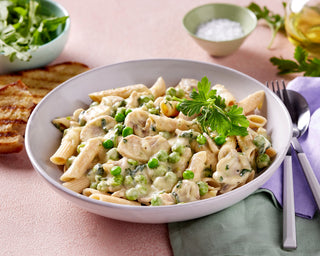
What is mindful eating?
Mindful eating involves focusing on the present moment, whilst acknowledging and accepting, your feelings, thoughts and bodily sensations. - which pretty much means we need to register that we are eating.... so no eating at your desk or in front of the TV!
Fundamentally mindful eating involves eating slowly and without distraction, - and we all know how distracting your fav show is - listening to hunger cues and feeling full, engaging your senses - what colours are on your plate, what does it smell like?, coping with negative feelings of guilt towards food, eating for health, and appreciating your food!
Why is mindful eating important?
In the world we live in we are constantly distracted by technology that's at our fingertips, buzzing on our wrist or on the screen in front of us. This applies at meal time too, meaning our brains are less likely to register that it's meal time! So eating has become a mindless act, you’re probably thinking well I don't need my brain to eat, that's my stomach's job! Mmm if only it was that simple. Mindful eating allows your whole body to tune in and register that you are eating, helping with hunger and fullness cues there for can avoid overeating or undereating.
Being mindful and having a positive relationship with food are so important in both your physical and mental well being, because in this diet-obsessed, media crazed, comparative society we live in, it’s easy to see how negative relationships with food started. We’ve been fed misleading information, shown unrealistic body shapes and sizes, focused on numbers, and labeled food groups. Potentially allowing us to lose sight of the importance of food to us physically and mentally, damaging our relationship with food. This relationship is one that holds so much to our happiness, as eating is one of the few things that brings humans pure pleasure and should be taken seriously.
So do you have a positive relationship with food? don't rush this one, have a long hard think and while you ponder on this question, have a read over 9 aspects that create a healthy relationship with food.
1. Understanding food for your physiological and emotional needs
To create a positive relationship with food, we firstly need permission to eat. Diet mentality has taken away this permission, disconnecting us from our mind and body. We need to eat for our physiological needs first, listening to our bodies cues when we are hungry. And then consuming appropriate macro and micronutrients to meet the recommended daily intake and then finish eating when the body and the mind are satisfied. Secondly, we need to meet our emotional needs, as food isn't just power for our bodies but pleasure and is the gateway to positive experiences and feelings.
2. Positive self talk
Don't be a bully, beating yourself up doesn't help anybody and it leads to anxiousness and stress. Positive self-talk is an important part of life and is equally important when it comes to food. It has benefits for yourself and those around you. With this, we need to unlabeled food groups, as it leads to feeling guilty. We need to make good choices for our bodies and trust that our bodies know what to do with this food.
3. Relaxed eating and mealtime
Creating meal times reinforces to your body and mind that you are eating. This allows us to relax while we are eating, meaning we can be attuned to our hunger. This gives us the ability to listen and satisfy our hunger, allowing pleasure and absence of guilt. Relaxed eating allows us to eat when we are hungry and stop when we are satisfied. Mealtime for many people is slowly being lost - with busy lifestyles, people throw it out the window first. This decreases our appreciation for the food we are eating and not allowing our bodies to recognise that we are eating.
4. Satiety vs feeling full
Once we are relaxed we create the opportunity to be in tune with our body, listening to cues from our bodies that we are satisfied. There is a difference in satiety vs feeling full, slowing our eating and taking time to understand this difference can help with overeating.
5. Emotional eating
Are you hungry or are you tired or stressed? Before you walk to the pantry, take a minute to think and listen to your body, remember the natural feelings of hunger do they match? Humans have been using food as comfort for years, we use food as a tool for numbing what is happening around us. This leads back to food bringing us pleasure which is great, but this is a short term fix. The real question is why are you stressed and why are you tired?
6. No rules!
Rules are made to be broken, meaning dietary restraint is temporary. When we sign ourselves up to a FAD diet, we are briefed on foods to eat that don't always satisfy, but we consume as a tool for weight loss. Leaving us in an unfulfilled or empty state of mind, leading to relapse. It’s why FAD diets don't stick. We have to be realistic to ourselves, and set goals that are achievable long term. This will lead to a dietary lifestyle that works for you, “everything in moderation” makes sense as there is a place for everything you are eating.
7. Be flexible
With no rules, we can be flexible! Because realistically we are going to be in situations we want to indulge or where our ideal meals aren't available. Being flexible means you let go of food “labels” and allow yourself to make different choices, indulge in food and not beat yourself up or feel guilty. It allows you to be spontaneous and live in the moment.
8. Don't compare
Us humans are constantly comparing ourselves to others, including our plates. We are unique individuals who have different emotional and physiological needs when it comes to food, what works for us doesn't always work for others. We have to let go of what our friends are doing and do it for ourselves.
9. Food + Body + Self
This is a three-way love triangle that we have to pay more attention to, we need to take ourselves seriously and look after our bodies. Fill it with as much goodness as possible to thank them for working so hard for us every day.
With these tips we hope you can answer this question to yourself truthfully, allowing you to reflect or re-evaluate your relationship with food. We hope you can battle obstacles, celebrate wins and be positive, but most of all we wish you and your relationship with food a happy ever after.




